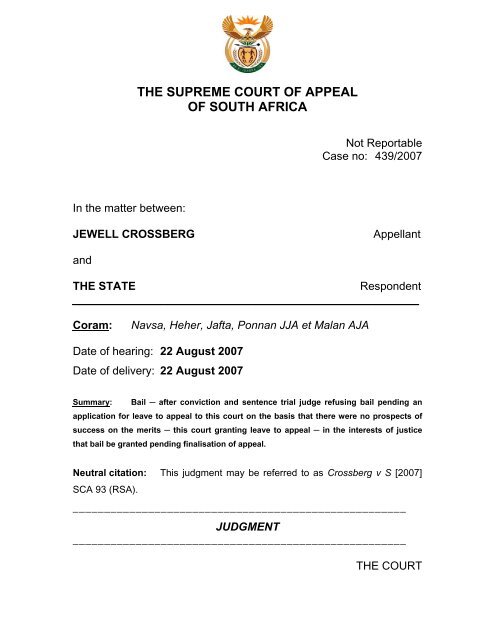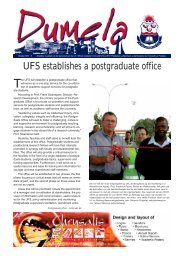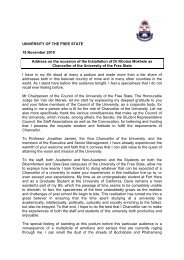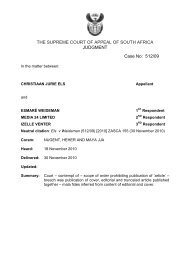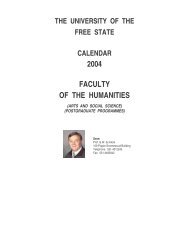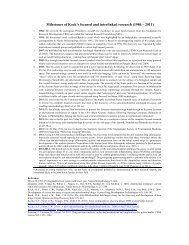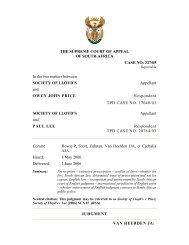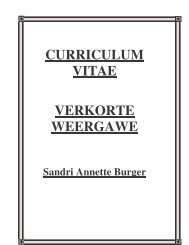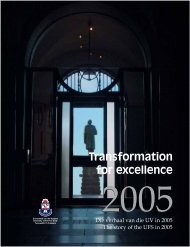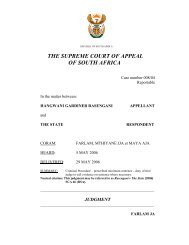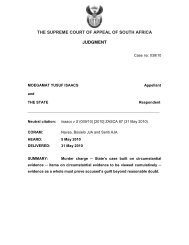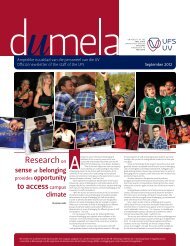THE SUPREME COURT OF APPEAL OF SOUTH AFRICA
THE SUPREME COURT OF APPEAL OF SOUTH AFRICA
THE SUPREME COURT OF APPEAL OF SOUTH AFRICA
You also want an ePaper? Increase the reach of your titles
YUMPU automatically turns print PDFs into web optimized ePapers that Google loves.
<strong>THE</strong> <strong>SUPREME</strong> <strong>COURT</strong> <strong>OF</strong> <strong>APPEAL</strong><strong>OF</strong> <strong>SOUTH</strong> <strong>AFRICA</strong>Not ReportableCase no: 439/2007In the matter between:JEWELL CROSSBERGAppellantand<strong>THE</strong> STATERespondent_______________________________________________________Coram:Navsa, Heher, Jafta, Ponnan JJA et Malan AJADate of hearing: 22 August 2007Date of delivery: 22 August 2007Summary: Bail ─ after conviction and sentence trial judge refusing bail pending anapplication for leave to appeal to this court on the basis that there were no prospects ofsuccess on the merits ─ this court granting leave to appeal ─ in the interests of justicethat bail be granted pending finalisation of appeal.Neutral citation: This judgment may be referred to as Crossberg v S [2007]SCA 93 (RSA)._____________________________________________________JUDGMENT_____________________________________________________<strong>THE</strong> <strong>COURT</strong>
2<strong>THE</strong> <strong>COURT</strong>:[1] This is an appeal against the refusal of bail accompanied by an applicationfor condonation for its late filing. The background is set out hereafter.The background[2] On 5 April 2007 the appellant Mr Jewell Crossberg was convicted in theTransvaal Provincial Division on a charge of murder and on four counts ofattempted murder. The State was held to have proved its case, namely that theappellant had shot and killed Mr Jealous Dube and had fired shots at four otherpersons with the same weapon with the intention of killing them.[3] The appellant was sentenced to 20 years’ imprisonment on the charge ofmurder and five years’ imprisonment on each of the four counts of attemptedmurder. The trial court ordered that the sentences run concurrently. Thus theappellant was sentenced to an effective sentence of 20 years’ imprisonment.[4] After the appellant had been sentenced he applied for leave to appeal tothis court against the convictions. This was refused by the trial court. He appliedfor bail pending his application for leave to appeal to this court. That applicationwas also refused by the trial court.[5] In refusing bail the trial court said the following:‘The general attitude of a court is that when an accused person is still awaiting trial and wherethere is no indication that the interests of justice might be prejudiced that such an accused personshould be released on bail on suitable conditions pending his trial. The notion is underpinned bythe presumption of innocence against any accused person, which exists in our law. However,once an accused person has been convicted and sentenced, the position changes radically,because the presumption of innocence against the accused is no longer applicable and the courtnow knows for a fact that an accused person has in fact been convicted. . .
3[T]he pivotal and decisive consideration in such an application is the reasonable prospect ofsuccess on appeal as it would serve no purpose to release an accused on bail pending an appealwhich is doomed to fail.’[6] The trial court concluded as follows:‘Suffice to say that having given this matter careful consideration I am not satisfied that there is areasonable prospect that the Supreme Court of Appeal will grant the petition for leave to appeal.’[7] On 11 June 2007 this court granted the appellant leave to appeal theconvictions referred to earlier. Counsel for the State was approached by theappellant’s legal representatives to ascertain the State’s attitude in the light ofthis new development. According to the affidavit of the appellant, which the Statedid not controvert, counsel for the State agreed that since the very basis of therefusal of bail had fallen away the State would not oppose a fresh application forbail. Indeed, according to the appellant the State agreed bail conditions subjectto approval by the court.[8] An approach by appellant’s counsel (accompanied by counsel for theState) to the trial judge to arrange the hearing of a fresh application for bail wasunsuccessful. Another judge was appointed by the Deputy Judge-President tohear the application. The problem was that the judgments in terms of which theappellant was convicted and sentenced, as well as the judgments refusing theapplication for leave to appeal and the bail application, had not been revised andsigned by the trial judge. Repeated attempts to have the judgments finallyrevised and signed failed.[9] In his affidavit the appellant refers to a number of conversations betweenhis legal representatives and the trial judge, as well as with the judge appointedto hear the fresh application. It is not necessary for present purposes to explorethis aspect any further, save to record that it is not disputed that months elapsedwithout the fresh application being finalised.
4[10] This frustrating state of affairs led the appellant’s legal representatives toadvise the appellant to proceed with this appeal against the initial refusal by thetrial judge to grant bail pending an application for leave to appeal his convictionsto this court. I record that the fresh application for bail has in any event recentlybeen withdrawn.[11] The State filed heads of argument but no affidavit denying any of thematerial facts upon which the appellant relied. At the commencement of thehearing before us counsel for the State conceded that he had no basis uponwhich to oppose the present appeal.The law[12] The appellant was convicted of murder and attempted murder, which inthe ordinary course attract heavy sentences.[13] It is so that there is a different emphasis in respect of bail pendingfinalisation of a trial as against bail pending finalisation of an appeal. Thepresumption of innocence operates in favour of an accused person until his guilthas been established in court. 1[14] Section 60 of the Criminal Procedure Act 51 of 1977 regulates thegranting of bail pending finalisation of a trial. In respect of bail pending a petition1 Section 35(1)(f) of the Constitution gives arrested persons a right to be released from prison ifthe interests of justice permit, subject to reasonable conditions. This of course clearly deals withthe position before finalisation of a trial. In S v Acheson 1991 (2) SA 805 (Nm) Mahomed J saidthe following at 822A-C:‘An accused person cannot be kept in detention pending his trial as a form of anticipatorypunishment. The presumption of the law is that he is innocent until his guilt has been establishedin Court. The Court will therefore ordinarily grant bail to an accused person unless this is likely toprejudice the ends of justice.’See also Du Toit et al Commentary on the Criminal Procedure Act in relation to pre-trial releaseat 9-2A to 9-5.
5to this court the High Court has a common law power to release the would-beappellant. See in this regard S v Hlongwane. 2[15] The prospects of success are very relevant in an assessment of whetherto release the appellant pending finalisation of an application for leave to appeal. 3As pointed out in the Hlongwane case, a substantial number of applications forbail pending a further appeal are launched as a dilatory tactic. 4 That of courseamounts to an abuse of court process. On the other hand, there may be anumber of such applications that are meritorious.[16] Bail applications should in principle be heard as a matter of urgency. InMagistrate, Stutterheim v Mashiya 5 , this court said the following:‘It is evident that finalising an application for bail is always a matter of urgency. ... And if bail isrefused, the decision can be appealed. The right to a prompt decision is thus a procedural rightindependent of whether the right to liberty actually entitles the accused to bail.’ 6[17] Over and above the procedural right is the Constitutional right to freedomand security of the person as set out in s 12(1) of the Constitution. Our courtshave always treated matters of personal freedom as matters of importance andurgency.[18] The appellant has the right to appeal the refusal of bail without prior leaveof the High Court. See in this regard S v Van Wyk 2005 (1) SACR 41 (SCA).[19] It is important to note that the appellant was released on bail during theentire period of his trial. It is not disputed that the State, recognising that bail hadbeen refused by the trial court on the narrow basis that there were no prospectsof success, agreed not to oppose a fresh application for bail and in fact agreed2 1989 (4) SA 79 (T) at 102A-G3 Hlongwane at 102D-G.4 At 102E-G.5 2003 (2) SACR 106 (SCA) at 113c-d.6 See also Du Toit et al at 9-8.
6bail conditions subject to the court’s approval. As noted earlier the State has notfiled an affidavit in opposition and has therefore not indicated that the appellant isa flight risk. Furthermore, there is no factual basis on which one can concludethat it is not in the interests of justice for the appellant to be released pending thefinalisation of his appeal.[20] Leave to appeal was granted by this court. The trial court’s emphatic viewthat there were no prospects of success would therefore appear to have beenwithout foundation.[21] The amount and conditions of bail agreed by the State are reflected in theorder that is to follow. In our view, it is in the interest of justice that the appellantbe released on bail in the amount and on the conditions agreed by the State.Condonation[22] The appellant has explained that he was advised first to pursue anapplication for leave to appeal before proceeding with the appeal against therefusal of bail by the trial judge. Of course, in the event that the application forleave to appeal to this court against the convictions failed, the appellant wouldnot have proceeded with the appeal against the refusal of bail.[23] Furthermore, it is due to no fault of the appellant that he was unable toarrange the hearing and finalisation of a fresh application for bail. Thus, theappellant has provided a satisfactory explanation and is entitled to condonation.[24] There is one further aspect that requires attention. It is regrettable that theState has waited until the matter was called in open court to make known itsattitude in respect of the present appeal. The consequence has beeninconvenience and for the appellant it involved the costs of engaging twocounsel.
7[25] The following order is made:(a) The application for condonation is granted.(b) The appeal is upheld.(c) The order of the court below is set aside and substituted with thefollowing:‘The applicant is granted bail in an amount of R50 000.00 (Fifty Thousand Rand) pending thefinalisation of his appeal in the Supreme Court of Appeal on the following conditions:(a) Applicant is prohibited from obtaining any passport and/or any other travelling documentwhilst on bail.(b) The Applicant is prohibited from visiting any International Airport or Harbour whereaccess can be obtained to any means of leaving the Republic of South Africa.(c) The Applicant is prohibited from leaving the Northern Province without the prior writtenconsent of the Investigating Officer in this matter.’_________________M S NAVSAJUDGE <strong>OF</strong> <strong>APPEAL</strong>_________________J A HEHERJUDGE <strong>OF</strong> <strong>APPEAL</strong>_________________C N JAFTAJUDGE <strong>OF</strong> <strong>APPEAL</strong>_________________V M PONNANJUDGE <strong>OF</strong> <strong>APPEAL</strong>_________________F R MALANACTING JUDGE <strong>OF</strong> <strong>APPEAL</strong>


